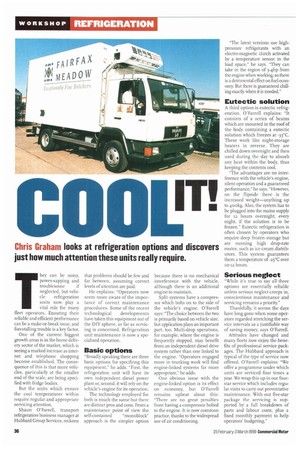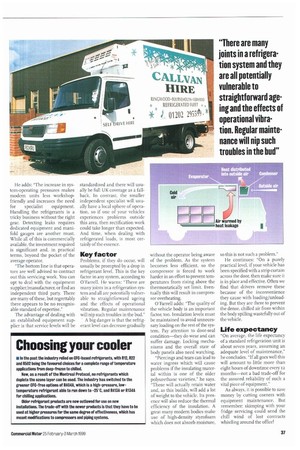Chris Graham looks at refrigeration options and discovers just how much attention these units really require.
Page 38

Page 39

If you've noticed an error in this article please click here to report it so we can fix it.
They can be noisy, power-sapping and troublesome if neglected, but vehi
cle refrigeration units now play a vital role for many fleet operators. Ensuring their reliable and efficient performance can be a make-or-break issue, and forestalling trouble is a key factor.
One of the current biggest growth areas is in the home delivery sector of the market, which is seeing a marked increase as internet and telephone shopping become established, The consequence of this is that more vehicles, particularly at the smaller end of the scale, are being specified with fridge bodies.
But the units which ensure the cool temperatures within require regular and appropriate servicing attention.
Shaun O'Farrell, transport refrigeration business manager at Hubbard Group Services, reckons that problems should be few and far between, assuming correct levels of attention are paid.
He explains: "Operators now seem more aware of the importance of correct maintenance procedures. Some of the recent technological developments have taken this equipment out of the DIY sphere, as far as servicing is concerned. Refrigeration unit maintenance is now a specialised operation.
Basic options
"Broadly speaking there are three basic options for specifying this equipment," he adds. "First, the refrigeration unit will have its own independent diesel power plant or, second, it will rely on the vehicle's engine for its operation.
The technology employed for both is much the same but there are distinct pros and cons. From a maintenance point of view the self-contained "rnonoblock" approach is the simpler option because there is no mechanical interference with the vehicle, although there is an additional engine to maintain.
Split systems have a compressor which bolts on to the side of the vehicle's engine. O'Farrell says: "The choice between the two is primarily based on vehicle size, but application plays an important part, too. Multi-drop operations, for example, where the engine is frequently stopped, may benefit from an independent diesel drive system rather than one linked to the engine. "Operators engaged more in trunking work will End engine-linked systems far more appropriate," he adds.
One obvious issue with the engine-linked option is its effect on economy, but O'Farrell remains upbeat about this: "There are no great penalties from having a compressor bolted to the engine. It is now common practice, thanks to the widespread use of air conditioning. "The latest versions use highpressure refrigerants with an electro-magnetic clutch activated by a temperature sensor in the load space," he says. They can take in the region of 3-4hp from the engine when working, so there is a detrimental effect on fuel economy. But there is guaranteed chilling exactly when it is needed."
Eutectic solution
A third option is eutectic refrigeration. O'Farrell explains: "It consists of a series of beams which are mounted in the roof of the body containing a eutectic solution which freezes at -33°C. These work like night-storage heaters in reverse. They are chilled down overnight and then used during the day to absorb any heat within the body, thus keeping the contents cool.
"The advantages are no interference with the vehicle's engine, silent operation and a guaranteed performance," he says. "However, on the flipside there is the increased weight—anything up to 400kg. Also, the system has to be plugged into the mains supply for 12 hours overnight, every night, if the solution is to be frozen." Eutectic refrigeration is often chosen by operators who require deep frozen storage but are running high drop-rate routes, such as ice cream distributors. This system guarantees them a temperature of -25°C over 10-12 hours.
Serious neglect
"While it's true to say all three options are essentially reliable unless serious neglect creeps in, conscientious maintenance and Servicing remains a priority."
Thankfully, it seems the days have long gone when some operators regarded stretching the service intervals as a justifiable way of saving money, says O'Farrell.
Attitudes have changed and many fleets now enjoy the benefits of professional service packages. The Hubbard approach is typical of the type of service now offered. O'Farrell explains: "We offer a programme under which units are serviced four times a year. We wrap this up in our fourstar service which includes regular visits to carry out preventative maintenance. With our five-star package the servicing is supported by a full breakdown of parts and labour costs, plus a fixed monthly payment to help operators' budgeting."
He adds: "The increase in system-operating pressures makes modern units less workshopfriendly and increases the need for specialist equipment. Handling the refrigerants is a tricky business without the right gear. Detecting leaks requires dedicated equipment and manifold gauges are another must. While all of this is commercially available, the investment required is significant and, in practical terms, beyond the pocket of the average operator.
"The bottom line is that operators are well advised to contract Out this servicing work. You can opt to deal with the equipment supplier/manufacturer, or find an independent third party. There are many of these, but regrettably there appears to be no recognisable standard of expertise."
The advantage of dealing with an established equipment supplier is that service levels will be standardised and there will usually be full UK coverage as a fallback. In contrast, the smaller independent specialist will usually have a local sphere of operation, so if one of your vehicles experiences problems outside this area, then rectification work could take longer than expected. And time, when dealing with refrigerated loads, is most certainly of the essence.
Key factor
Problems, if they do occur, will usually be prompted by a drop in refrigerant level. This is the key factor in any system, according to O'Farrell. He warns: "There are many joints in a refrigeration system and all are potentially vulnerable to straightforward ageing and the effects of operational vibration. Regular maintenance will nip such troubles in the bud." ' A big danger is that the refrigerant level can decrease gradually without the operator being aware of the problem. As the system becomes less efficient, so the compressor is forced to work harder in an effort to prevent temperatures from rising above the thermostatically set limit. Eventually this will result in compressor overheating.
O'Farrell adds: "The quality of the vehicle body is an important factor, too. Insulation levels must be maintained to avoid unnecessary loading on the rest of the system. Pay attention to door-seal condition—they do wear and can suffer damage. Locking mechanisms and the overall state of body panels also need watching.
"Piercings and tears can lead to water ingress which will cause problems if the insulating material within is one of the older polyurethane varieties," he says. "These will actually retain water and, as this builds, will add a lot of weight to the vehicle. Its presence will also reduce the thermal efficiency of the insulation. A great many modem bodies make use of high-density styrofoam which does not absorb moisture,
so this is not such a problem."
He continues: "On a purely practical level, if your vehicle has been specified with a strip curtain across the door, then make sure it is in place and effective. Often we find that drivers remove these because of the inconvenience they cause with loading/unloading. But they are there to prevent the dense, chilled air from within the body spilling wastefully out of the vehicle.
Life expectancy
"On average, the life expectancy of a standard refrigeration unit is about seven years, assuming an adequate level of maintenance," he concludes. "If all goes well this will amount to little more than eight hours of downtime every 12, months—not a bad trade-off for the assured reliability of such a vital piece of equipment."
As always, it is possible to save money by cutting corners with equipment maintenance. But remember: skimping with your fridge servicing could send the chill wind of lost contracts whistling around the office!
















































































































